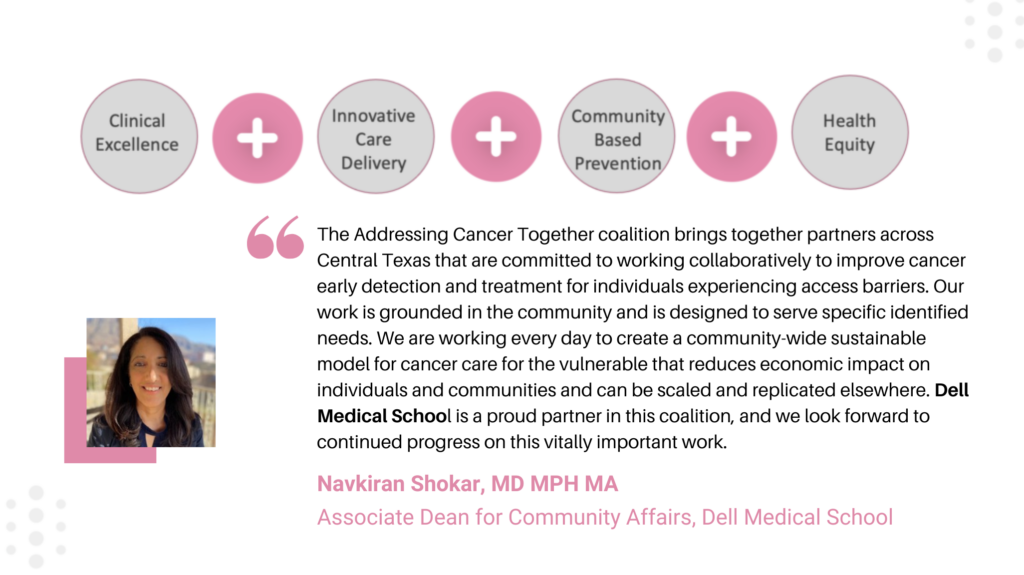
What is CTX-ACT?
The Addressing Cancer Together (ACT) coalition is working with members of the Austin Area Research Organization (AARO) Health Committee, Dell Medical School, and many more, to facilitate the development of a regional model to improve cancer care for high needs patients.
ACT expands access to life-saving cancer screening, diagnosis, and treatment. Through coordinated collaboration of healthcare providers, funders, nonprofits, volunteers, and patients with lived experience, ACT is saving lives and reducing the financial burden of cancer.
ACT is convened by United Way for Greater Austin as part of the organization’s collective impact work to fight poverty.
Our Goals

Early Diagnosis
Lower the number of late-stage breast cancer diagnoses by working with citizens in counties not covered by the Travis healthcare district

Better Patient Outcomes
Earlier screening and diagnosis saves lives, lowers treatment costs, and supports a productive community and better patient outcomes

Strategic Alignment
Shift available resources upstream, allocate patients fairly across providers, take advantage of insurance options and federal funding
Members
Alliance for African-American Health in Central Texas
American Cancer Society, Inc. South Region
Ascension Seton Breast Care Center
Austin Area Research Organization (AARO)
Austin Radiological Association
Bluebonnet Trails Community Services
Community Health Centers of South Central Texas
Greater San Marcos Partnership
Design Principles
Changing our model of cancer care to better serve our highest needs patients will not be fast or easy. Knowing that we needed a robust, sustainable, in many ways ground-breaking solution, one of the first things our coalition did was develop consensus – across providers, clinics, oncologists, researchers, community leaders and survivors – on what success would look like. These Design Principles together represent the commitment of the members of Addressing Cancer Together coalition to the future we aim to create in cancer care.
Shared Services Model
Cancer care for the uninsured in Central Texas is provided by an array of providers who share both the risks and community/financial resources to serve these patients.
Transparent: Money & Access
A successful systemic approach to regional cancer care will share information among coalition members, with patients, with public and private funders, and with the community.
Maximize Efficiency of Resources
Medical care is expensive, and the resources to support care for uninsured patients are constrained.
Data Driven
Extensive data is collected as patients move through the screening and treatment process. Decision making and prioritization should be motivated by these quantitative and qualitative data.

Regional
Cancer does not follow county lines. An effective regional solution will ultimately include all patients in the six county Central Texas region.
Focused on High Needs Patients
The intention of Addressing Cancer Together is to increase access to cancer care for patients currently facing higher risks of negative cancer outcomes and lower access to care.
Regional Cancer Services Model
The Regional Cancer Care for the Uninsured initiative engages all facets of the Central Texas health ecosystem including FQHCs, private providers, hospital systems, as well as community, city and county leaders, to provide a solution that can be efficiently and equitably distributed across the ecosystem.
Travis County - MAP
Today, if you are uninsured, <200% FPL and diagnosed with cancer in Travis County and qualify for MAP, ready path for care.
Surrounding Counties
- If <~21% FPL, qualify for $30K/year indigent care
- ~40% qualify for Medicaid for Breast & Cervical Cancer (MBCC)
- Otherwise, search for limited charity care or risk death

Designing Viable Model
AARO working with counties, providers, FQHCs, researchers to define and pilot a better model.
Learn how you can get involved with our organization.
Translate this page
